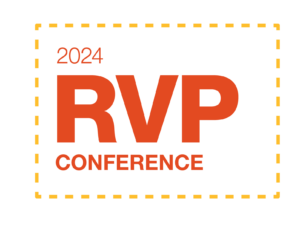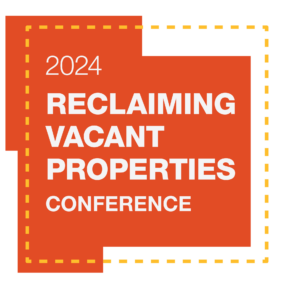Present at RVP
High quality conference sessions are key to equipping our attendees with the tools effect change at home. Thank you to all who submitted a session proposal for this year's Reclaiming Vacant Properties Conference! The deadline to submit a session proposal was March 7, 2024, and we are no longer accepting session proposals for RVP 2024.
Proposal Submission Timeline
| January 23, 2024 | RFP released |
| March 7, 2024 | Proposal submission deadline |
| April 18, 2024 | Acceptance notifications |
Evaluation Criteria
The Center for Community Progress evaluates all proposals using the following criteria:
- Clearly articulated focus and learning outcomes
- Thoughtful, cohesive, and well-written ideas and structure
- Showcases innovative and practical tools, strategies, policies, or programs
- Equips attendees with actionable ideas or relevant research to inform their work
- Presenters are qualified and relevant to the purpose and learning outcomes of the session
- Includes diverse voices that reflect the racial, ethnic, gender, and other diversity of the communities served
- Extra consideration will be given to session proposals that include panelists from multiple geographies (e.g., multiple cities, states)
The following will result in disqualification. Disqualified proposals will not be evaluated.
- Incomplete session proposals
- Session proposals that appear to be a product or service promotion
- Session proposals received after the submission deadline of March 7, 2024
Looking for more session proposal guidance? Check out our Tips for a Successful Session Proposal for RVP 2024.
Topics
Applicants must align proposed sessions with at least one and no more than two of the topic areas below. The possible subjects listed under each topic simply provide examples and are not intended to be a comprehensive list of all possible subjects within each topic area.
Arts, Placemaking, and Culture
Possible Subject Matter:
- Partnering with artists and arts organizations on vacant property reuse
- Using arts, placemaking, and culture to address neighborhood challenges resulting from public health, housing, and economic crisis
- Supporting economic development through placemaking or the arts
- Equitable, resident-driven development through creative placemaking
- Embedding arts and culture in larger community revitalization initiatives
- Vacant commercial properties
Code Enforcement and Rental Properties
Possible Subject Matter:
- Moving from reactive to proactive code enforcement of vacant and deteriorating properties
- Cost recovery
- Rental licensing and registration
- Maintaining high quality housing stock to prevent vacancy
Disaster Recovery and Resilience
Possible Subject Matter:
- Proactive/preventative or reactive policies or programs to prepare for increased property vacancy and deterioration in the wake of natural or man-made disasters
- Making the case for vacant properties strategies within climate change adaptation and resilience plans
Economic and Workforce Development
Possible Subject Matter:
- Strategies to unlock the economic potential in vacant properties (particularly in low-value property markets)
- Initiatives to support wealth- and asset-building for residents
- Leveraging vacant buildings and lots to support job creation
- Vacant commercial and industrial property reuse.
Housing Stabilization
Possible Subject Matter:
- Home repair and rehabilitation financing or grant programs to address property deterioration
- Property deconstruction or demolition strategies
- Addressing contractor base to support rehabilitation and repair
- Rehabilitation of vacant properties for quality affordable housing
- Wealth preservation through housing market stabilization
- Heirs’ property
- Access to capital for homebuyers
- Alternative ownership models
Institutional and Private Sector Partnerships
Possible Subject Matter:
- Partnering with anchor institutions and philanthropic entities
- Opportunity Zones
- Attracting mission-oriented developers
- Revitalizing business districts
- Revitalizing commercial properties
Land Banks and Land Banking
Possible Subject Matter:
- Management, transparency, and oversight
- Funding mechanisms
- Successful partnerships
- Innovative acquisition, disposition, rehabilitation and maintenance programs
- Community engagement
Mortgage and Tax Foreclosure
Possible Subject Matter:
- Delinquent tax enforcement systems and innovations to address vacant and deteriorated properties
- Sale of property tax liens
- Preventing mortgage foreclosure
- Equitable reuse of REO properties
- Complying to changing legal environments
Planning, Data, and Evaluation
Possible Subject Matter:
- Property data systems and cross-department collaboration on data
- Understanding markets and market-informed approaches
- Comprehensive planning for vacant properties and revitalization
- Measuring progress
- Evaluating success
Public Safety and Public Health
Possible Subject Matter:
- Partnerships with local law enforcement
- Crime reduction tactics related to vacancy and abandonment
- Partnerships with local hospitals and other public health organizations
- Improving public health by addressing vacancy and abandonment
Building Rehab and Reuse
Possible Subject Matter:
- Creative financing mechanisms for rehab or reuse of residential, commercial, or industrial properties
- Rehab programs that focus on improving building performance and resiliency
- Historic preservation strategies
- Access to capital for rehab
Vacant Land Stewardship
Possible Subject Matter:
- Alternative reuse options like green infrastructure or energy production
- Positioning vacant land to address climate change
- Innovative finance models
- Community wealth-building through vacant land reuse
- Effective maintenance strategies
- Funding and ownership structures for long-term alternative use
- Acquisition and disposition strategies
State and Federal Policy and Programs
Possible Subject Matter:
- Navigating federal or state funding opportunities like ARPA, CDBG-DR, FEMA, USDA
- Making the case for funding
- Partnering effectively
- Advocacy models for local, state, or federal policy reform
For more information about format and topics, review the full request for session proposals here.
Contact Information
Questions about this proposal process should be directed to Thamarrah Jones at [email protected]. We will do our best to address all questions, however, questions received less than 72 hours prior to the March 7, 2024 deadline may not receive a response.
Additional information about the 2024 Reclaiming Vacant Properties Conference is available at communityprogress.org/rvp24.
Questions about the Reclaiming Vacant Properties Conference? Please reach out to Thamarrah Jones at [email protected].
#rvp2024


